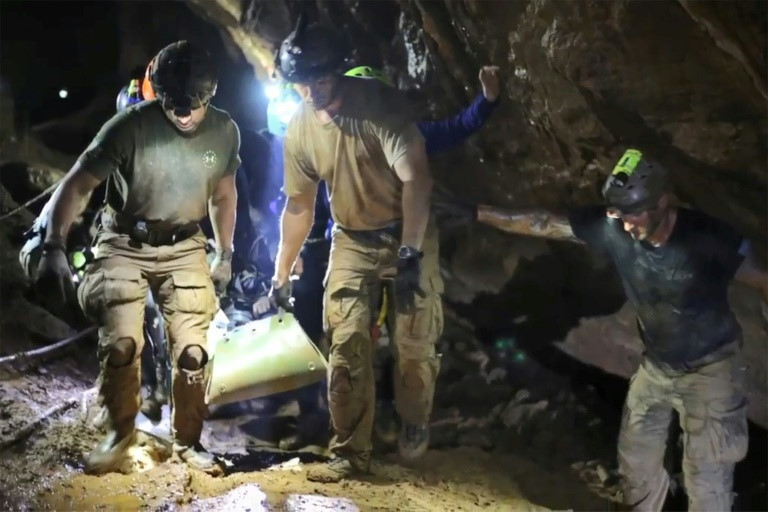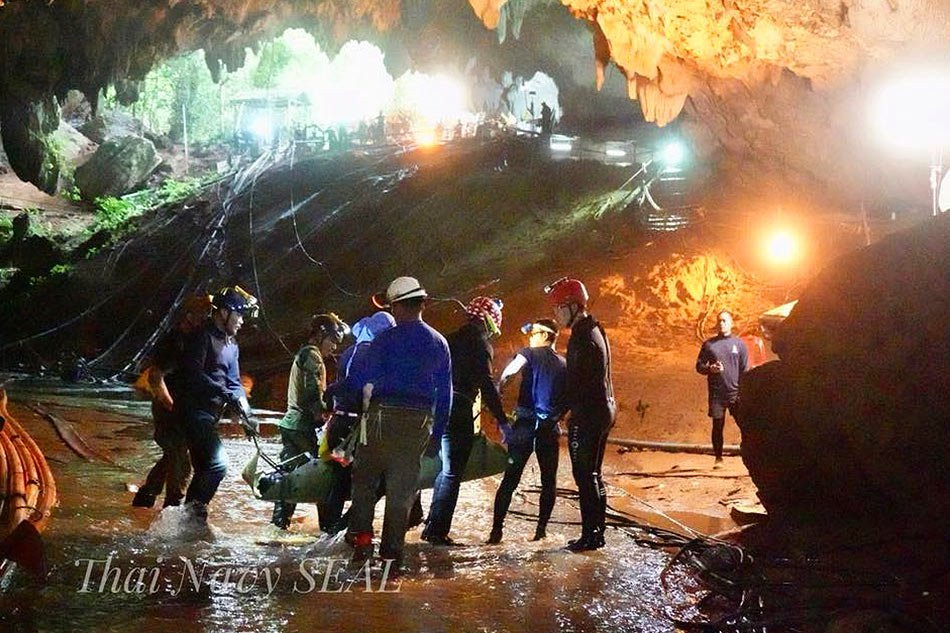SEALs reveal reason for using sedatives to rescue soccer players
Thai SEALs revealed that the soccer team members were "anesthetized" and taken out on stretchers instead of swimming as originally planned, helping the rescue to be more successful and faster.
A video shared by the SEALs on Facebook shows the children “anesthetized,” wearing swimsuits and oxygen masks. Divers place them on stretchers and carry them out.
Chaiyananta Peeranarong, a former Navy SEAL, toldAFP: “Some of them are sleeping, some can still wave their arms. Our job is to move them out.”
Doctors were deployed along the 4km route from the trapped team to the main entrance to monitor the situation. After being released from the cave, the boys were immediately transferred to an isolation room at Chiang Rai Provincial Hospital for monitoring and treatment.
Conflicting information
The details of how the team was sedated and carried off have been the subject of controversy, with conflicting reports about the amount of sedatives used to keep the boys calm, or whether they were completely anesthetized.
CBS NewsThe victim was reportedly given only sedatives and anti-anxiety medications, but sourcesAFPsaid the boys were given anesthesia. Thai Prime Minister Prayut Chan-o-cha said the boys were given sedatives but denied any anesthesia.
|
| Seals and divers carry the soccer team members out. Photo:AFP. |
SourceBBCgave conflicting accounts of the sedation level. One of the divers involved in the rescue toldBBCThe children were given general anesthesia before the rescue to avoid panic while moving through the narrow underwater cave.
Some sources say the team members were only partially conscious when they were brought out of the cave. The coach was the only one who swam and dived out with the help of divers.
Why anesthesia?
Before the rescue operation, rescuers said divers would teach the team how to swim and dive. However, many of the team members do not know how to swim, let alone dive underwater.
Meanwhile, time is running out, the four-month rainy season is about to enter its peak. If the team cannot be brought out before most of the cave is flooded, they may have to stay for another four months.
Cave rescue is an extremely dangerous job, even for professional divers. The cave section from the “Sam Yak” junction to “Doc Nern Nom Sao” is 1.7 km long. Where the team got stuck, many sections are still submerged, one section that requires diving is only 0.72 m wide and 0.38 m high. Professional divers had to work very hard to get through here.
Plans were approved for the boys to swim and dive out with the help of divers. However, when diver-doctor Richard Harris, who has 30 years of experience in underwater rescue, arrived to conduct a medical examination of the trapped boys, the plan was immediately changed.
|
| Sedating the crew members helped speed up the rescue. Photo:Thai Navy Seal. |
The Wild Boar soccer team had spent nearly half a month in the dark cave, and their health and spirit had declined. Letting them swim and dive out by themselves posed many risks. During the movement, especially when going through the narrow, flooded cave, any panic could threaten their lives and the rescue team would not have time to react.
The death of a former Navy SEAL from oxygen depletion has highlighted the dangers and complexity of cave rescues, so sedating or anesthetizing the boys and carrying them out on stretchers is considered the most feasible solution.
Once sedated, the children's spirits were controlled, avoiding panic when moving through the flooded cave. The divers just had to carry them out. They were in complete control of the situation, helping to speed up the rescue time.
|
| Illustration of how rescuers brought the football team out. Graphics:Vox |
The change in the rescue plan was kept secret to avoid media hysteria and panic among relatives, an unnamed British diver told the Guardian on July 9.Vox Newsthat he could not reveal anything until the rescue operation was over.
The latest information has lifted the veil of mystery about the miraculous success of the operation. 13 people trapped in the cave, most of whom cannot swim or dive, were brought out safely without any incident.
Narongsak Osottanakorn, the rescue operation commander, said the entire rescue operation would not have been successful without the unique skills of doctor-diver Harris. However, he declined to provide further details.





